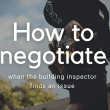If you have found a home you love but you’re not sure what the next steps are, this post will help you find out the information you need to move forward. Every single property is different, but there are some standard rules here which you can follow that will help you make smart, informed decisions.
Podcast version
Scroll down for a full transcript.
Follow the podcast and check out other episodes on Spotify, Google, Apple, Stitcher.
Let’s presume you’ve been to the house and checked it out, and you’re thinking you might want to try and buy it…
Know what questions to ask
You probably have many questions about the actual property itself, but some of the key ones to make sure that you cover off are:
Q: “What information is available? What reports or documents does the salesperson have on file that they can give you? “
This might include a LIM report, building inspection report, a copy of the title, an offer document, a rental appraisal. There is a wide spectrum of approaches around providing info upfront. Some agents provide a lot, some agents provide very little, but it’s important to ask what they do have so that you can judge what you’ll need to source yourself, and also to have a look at what the owner’s providing just to see whether you trust that information and whether you want to verify it yourself too.
Example: They might be providing a builders report, which is useful but you may choose to get your own report done as well.
The next question I would ask is,
Q: “How can I buy this home? What’s the process if you want to make an offer?”
Every single real estate company differs in how they approach this step.
You’ve got your different ways of buying, like auction or tender, and you’ve got variations within those. You’ve got auctions that can be sold prior, tenders that can be sold prior. Sometimes they’ll say, “No, we’re not taking any offers until the date.”
You’ve also got buyer-inquiry-over processes, fixed asking price strategies, and others being dreamed up all the time.
Whatever selling method is being used, what you need to know, is: If you make an offer today, when’s that going to go in front of the owner?
Can you make an offer today? Or will they not look at offers until a certain date?
Understand exactly what their process is so you don’t fall into the trap of making an offer, only to find out you’re going to have to wait seven days before anything happens with it. You don’t want to play your cards too early if you’re not going to get an answer quickly.
You also want to ask about their multiple offer process. If it’s not an auction or a tender and you make an offer, the agent will probably still call for interest.
What does ‘calling for interest mean’? Once your offer is in writing, they will call everybody else who has shown interest in the property and ask if they want to make an offer as well.
At that point, they might set a 24 or 48-hour deadline for other offers to come in by. If other offers come in, you are now in a competitive, multi-offer scenario.
This could come as a surprise to you, if you think, “Well, it’s not a tender, why am I in a multiple offer situation?” But this is a very common process that most real estate companies will go through. You want to understand before you offer how long that process is going to take.
Read: How to negotiate like a pro
Understand the competition
Try and ascertain from the agent how many people are showing interest in the home. Chances are the salesperson might overplay this, so take the information with a grain of salt, but it’s useful to know. The other key guide to this is how many people are at the open home viewing. If it’s only you there, then there’s a decent chance there might not be too much interest, but if there are 30 groups going through at once, chances are there might be other people that want to make an offer as well.
Work out what to offer
The next step in the process is to research pricing. There are a couple of easy steps here:
- Ask the agent if they’ve got a price guide,
- Visit homes.co.nz, to see what their estimate for the property is.
- Go to trademe.co.nz/property/insights which will give you another online home estimate.
- You can also use oneroof.co.nz, another online estimate tool.
These online tools are not going to be perfect guides, but they are going to give you information that helps you make an informed decision. When deciding what to offer, the more information you have, the better.
The next thing you want to do is ask the agent,
Q: “What recent sales have you compared this home to? What other properties have sold in this area that are somewhat similar to this property?”
Preferably, you’re looking for half a dozen sales here that you can work with. A good agent should be able to supply those to you. Sometimes you get properties which don’t have too many comparable sales, i.e. a lifestyle property where there hasn’t been a similar sale in the last six months. In that case, ask the agent for any properties that have sold in the nearby area in the last six months, even if they’re not similar.
Now go for a drive past those properties. If you’ve seen them earlier in your buying journey, then that’s awesome, but if you haven’t, go for a drive past and just look at the access. Obviously, you can’t go on the property, but just look, try and figure out the sun aspect, try and think about the location. Try and think, is this home better or worse, as far as you can tell, from the one you’re trying to buy? Look at what it sold for, this is another data point which is going to help you make an informed decision.
One cool tip is that you can often look up the address in Google and actually see all the photos from when that recent sale was on the market. That’ll help you further understand how comparable it is to the property you’re looking at right now.
I know it sounds weird to go and look at sales, what do you care about houses that’ve sold? You can’t buy them. I understand that, but this is going to help you make a smart decision when it comes to knowing what to offer on the one that you’re looking at. Don’t skip this research step, it’s the most effective tool you have to get educated about value.
Read How to work out the value of any property
Another question you want to ask the agent is,
Q: “What do I need to know about this home?”
Every agent is duty-bound to disclose any known issues to you, but often… In certain circumstances, this can come about when you make an offer. You might go to fill in an offer form, and suddenly the agent pulls out a disclosure sheet and shares with you a series of things that you might not have known, like maybe the fence isn’t on the right boundary line, or maybe the carport isn’t consented. It can be frustrating to find these things out late in the process, when you’ve already become emotionally attached. It’s better to find out earlier on so that you can either mentally adjust to them and get used to the idea, or you can make a plan for how you’re going to remedy those issues.
Bear in mind that disclosures can come out during the marketing process, so if the agent shares something with you two weeks in that they didn’t tell you at the start, it doesn’t necessarily mean they’ve been hiding it. A lot of times when you’re an agent, you don’t find things out about a property until you’re a little bit further into the process, until someone gets a builder through and discovers something, or until you get a LIM report which shares that there’s a missing consent, or an incomplete building consent, or something along those lines.
Sort your finances
The next step I would take is to get in touch with your bank or mortgage broker. Before you go too far, you want to understand whether you’re going to be able to buy this place. You want to give your mortgage broker a heads-up that, “Hey, this is the property I’m looking at, we’re pretty serious about it, we think we’re going to give it a shot / make an offer, what do you think?”
In a really hot market, if you’ve got the right sort of finance arrangement, sometimes your bank or mortgage broker will actually pre-approve you unconditionally for certain properties.
Read Tips for getting your mortgage application approved.
When should you involve your lawyer?
My advice is: Right from the start.
Basically, as soon as you’ve asked those discovery questions, as soon as you’ve researched pricing, as soon as you’ve figured out that this is a property you’re really keen on, I’d get your lawyer involved, and I would forward them any information that you have, whether it’s the title of the property, if they’ve got a LIM report, I’d pass that on, the sale and purchase agreement, the draft one that you might be able to get from the real estate agent, I would pass those things on to your lawyer, and just give them a heads-up that you’re thinking about this home.
If there’s a deadline, if it’s got a tender or auction date, give your lawyer a heads-up that that’s the date that you’ll be working to.
Should you get a builder’s report before you make an offer?
This is a common one that comes up, where buyers have found a home they really like, maybe the owner hasn’t provided a builders report, or if they have, you still want to get your own one as well, should you invest in that, knowing that there’s a chance you might miss out if you don’t win the offering and you end up spending money on a builder’s report for a house you don’t get?
It can be really worthwhile investing in a builders report up-front, even if you risk missing out, but I would judge whether you need to do that on the competition level that you see for that property.
How many other people are going to be offering on this home?
It is a hard question to answer, but I’d talk to the agent, go to the open home, see how many other people you see there, look at how many hits it’s had on Trade Me, how long’s it been on the market? If it’s been on the market for two and a half months and there haven’t been any offers in the last few weeks, you can probably make your offer subject to a builders report. If it’s a three-week tender in Wellington and the agent says they’ve got 10 people that have had second looks and there’s 30 groups at the open home, maybe you want to get your builders report done before the tender date to give yourselves a decent chance of giving it a shot.
The other contributing factor is probably how long you’ve been looking. If it’s the first time you’ve made your offer, I’d probably just make it subject to getting a builders report, so that means you’re putting in an offer with a condition that you’ll get a builders report later if you win the bid, if you… Sorry, if you win the multiple offer situation, whereas if you’ve missed out on four or five houses and you’re getting pretty sick of it, maybe you want to stump up for a builders report first to give yourself the best shot at this house.
The other contributing factor might be: How much you like this home?
Is it your dream home, is it the perfect one, is it the one you’ve been waiting for?
If so, you need to do everything you can to maximize your chances of getting that home. If, on the other hand, it’s a home that you like, that you’d be happy living in, but it’s not the one, then maybe you don’t need to get a builders report first. In that situation, you could make your offer subject to arranging and receiving a satisfactory building inspection report (the most common time frame for this is 5- 10 working days from acceptance of your offer).
Read Conditional vs. unconditional offers.
Don’t skimp on good advice
Yes, there’s a risk that you’ll spend this money and not get the home, but if you’re going out looking to buy a property and you’re spending hundreds of thousands of dollars, and you want to get it right, then just put aside a budget for research, like say you put aside five grand for builders reports and lawyers’ fees on researching properties.
You might end up missing out on three houses, but get the fourth one, and you might spend $3,000 on those houses that you missed out on, but put that down to that was your research cost of buying a home. Don’t say it was wasted money, say it was money that you set aside to do the right research on any home you were looking at. I’ve said in the past, this is like big kids’ Monopoly, this is not the time to skimp on costs, and there are some costs involved if you want to do it right. So at the start of the process, if you can, set aside some money for research, and don’t be upset when you miss out on a property, that’s sometimes just part of the process.
Should you offer early?
Let’s say it’s an auction in three weeks’ time, and you really love this house. One of the questions that comes up straight away is, “Should I offer now? Should I try and beat the competition by putting in an offer at this point?”
The answer comes down to how much time you’ve got available. If it’s three to four weeks out from the auction, I can understand putting an offer in early.
It’s important to understand that as soon as you make an early offer, it takes three to five days, sometimes a week, for that to get in front of the owner, for the owner to think about it, for them to decide to bring the auction date forward, to contact every other buyer who’s been keen on the place, to set the auction, to organize the auctioneer, to book a time at the office to do it, or in the auction room.
So even if you make the offer now, it could be a week before the brought-forward auction date actually occurs. With that in mind, If you’ve got three or four weeks before the advertised date, then put an early offer in if you want to.
If, on the other hand, it’s one or two weeks out from the advertised auction date, there’s probably not much point trying to bring it forward. An owner’s not going to bring the auction forward two days in most circumstances, or if it’s set for Tuesday next week, they’re not going to bring it forward to Friday this week. At that late stage, you might as well just see the process through.
Beware of playing your hand too soon…
The other thing about offering early is that you are playing your cards very early, so consider if that’s what you want to do.
With an auction, it’s quite nice to wait for the actual day and just see how things unfold and see what your competition is. To see where they start the bidding. When you make an early offer, you don’t know if you might’ve been able to actually buy it a little bit cheaper later on.
If the property is being sold via Tender (or deadline sale), it’s a little bit different. If you can offer early, and if you can secure the property early at a price that you would have paid at the tender anyway, then to me, that makes sense to put in an early offer.
For what it’s worth, when I was selling properties, I always advised owners not to consider early offers, to actually not sell before the tender day.
The reason is, in my opinion, the end result was likely to be better if they waited until the deadline day. Why? Great prices tend to occur when buyers only have one chance to buy that home.
So on the flip side, if you’re a buyer and the agent is going to let you offer early, I would take advantage of that. Especially in a tender where you’re going to be giving the other competition less time to get themselves ready, and you still get two goes at it. If you offer early in a tender and the owner turns it down, you can still have another go at the advertised deadline. Whereas if you wait until the advertised tender day, you’ll probably only get one shot at it.
Let’s recap
Questions to ask the agent:
- What info is available?
- How can I buy this home?
- What’s the process if I make an offer?
- What do I need to know about this home?
Next steps:
- Go and do your research around pricing, look at recent comparable sales, ask the agent for that information.
- Get in touch with your mortgage broker or your bank.
- Get your lawyer involved early.
- Should you get a builder’s report before offering? It depends on your situation, but if this house is the one and if you don’t want to miss out on it, get stuck in.
- Should you offer early if it’s a fixed deadline, auction or tender? Try and judge that on the competition.
When is the right time of week to offer?
The right time of the week is when you feel ready, but it would be my opinion that offering on a Friday is usually suboptimal. What’s going to happen there is the agent’s often going to want to still run the open home on Sunday, the owner’s still going to want the open home on Sunday, and so you might end up not having your offer presented until Sunday night or Monday, which means it’s been sitting there for three days, there’s that much time for other people to get interested.
I would offer early in the week, if you can. Offer on a Monday or a Tuesday, with the expectation that you should be hoping for your offer to be presented to the owner, within a day or two.
The only exception to that is when a property first goes on the market, some agencies have a rule that they won’t take any offers to the owner until it’s been on the market seven days, which I think is a good rule in general.
One final tip: Be patient
If you make an offer through any sort of strategy and you don’t hear back straight away, after a day, two days, even three days, don’t panic. Often, what this means is that the owner is considering your offer, and if they’re considering your offer, that’s a good thing.
The best thing you can give an owner is time. If your offer is a bit lower than where they were hoping to sell the property originally, then it’s not easy for an owner to just suddenly accept it straight away.
Sometimes they need a night or two to talk to family, to decide if they want to just move on with life and get on with it.
A lot of buyers make an offer on the lower end of the market value spectrum and then get upset when they don’t get an answer straight away.
Try and think about it from an owner’s point of view. Let them think about it if they want to. Resist the urge to put a deadline on your offer (eg. valid for 24 hours only). All that does, in my experience, is upset the owners and antagonizes the situation, and if you’re asking them to take an offer that’s lower than what they were hoping to get, that’s not going to help your offer get accepted.
Stay safe out there. Get the right advice and ask the right questions.
Best of luck on your buying journey.










Thank you so much for writing this blog and freely sharing your knowledge. Much appreciated.